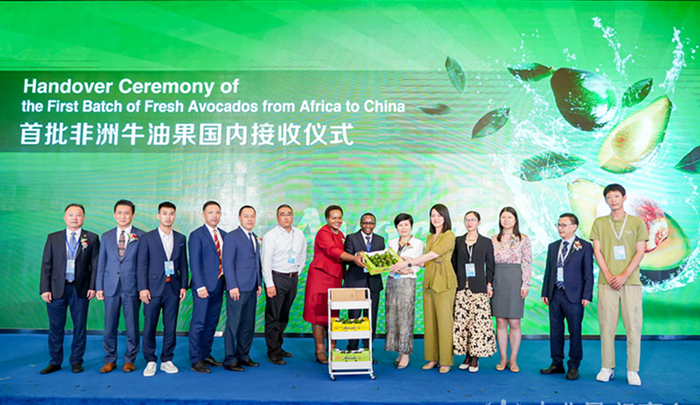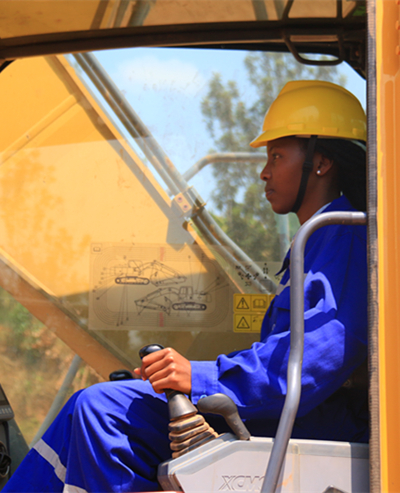|
||||||||||
| Home Nation World Business Opinion Lifestyle ChinAfrica Multimedia Columnists Documents Special Reports |
|
||||||||||
| Home Nation World Business Opinion Lifestyle ChinAfrica Multimedia Columnists Documents Special Reports |
| ChinAfrica |
| An Indispensable Link |
| China is an essential player in the development of Africa’s supply chain |
| By Ge Lijun 丨VOL. 14 October 2022 ·2022-09-23 |

The first batch of fresh African avocados is received in Beijing, China, on August 23 (CHINA-AFRICA BUSINESS COUNCIL)
Africa’s first large-scale shipment of fresh avocados has landed in China. On August 26, 45 tonnes of Kenyan avocados arrived in Shanghai on their way to key Chinese cities such as Beijing and Guangzhou. Kenya’s fresh avocados were approved for export to the Chinese market in June, making the country the first in Africa to export the fruit to China.
Greechain, a Chinese company, entered into an agreement with Kenya’s Sunripe to handle the shipping of fresh avocados. The deal came after the two nations signed agreements in January to promote bilateral trade in avocados and aquatic products.
The Report on Chinese Investments in Africa (2022): China-African Cooperation From a Supply Chain Perspective, released by the China-Africa Business Council (CABC) on August 23, states that Chinese companies have been actively involved in developing the supply chain in Africa recently, assisting African nations in overcoming supply chain hurdles.
Agricultural exports
The supply chain, according to the UK-headquartered Chartered Institute of Purchasing and Supplies, refers to the actions carried out inside an organisation to transform raw materials or component parts into completed goods or services for clients. Production, inventory, storage, transport, and information are the five main components. Greechain is a cutting-edge business that handles all five aspects, offering Chinese consumers high-quality agricultural products from Africa through processing, export, and sales.
Greechain has been working hard to grow the Kenyan market since 2019 as the primary partner in the Kenyan government’s avocado initiative. As a consequence, the first container of frozen Kenyan avocados was transported to China in July 2019. The company has also brought Dutch fumigation technology to Kenya and collaborated with agricultural specialists to develop standards that take into account regional conditions as well as Chinese customs requirements.
Lu Cuifeng, president of Greechain, told ChinAfrica, “We are presently working with seven avocado farms in Kenya, four of which are exclusive partners, with a total of roughly 500 farmers. We are seeking additional 20 local avocado farms for the future.” Lu revealed that processing is done locally, with extensive cooperation with VAL, the largest avocado processing factory in Kenya, which was established in 1972.
Greechain’s business operation is also connected with Kenya’s developing digital economy, which was made feasible by telecommunications behemoths like the Chinese firm Huawei. Its next digital system will monitor every step of the avocado’s life cycle, including planting, growth, ripeness, picking, processing, and transportation.
Government measures have boosted trade between the two sides. Following the Eighth Ministerial Conference of the Forum on China-Africa Cooperation (FOCAC) held in late 2021, a “green corridor” was created to facilitate the export of agricultural goods from Africa to China. According to Wu Peng, director general of the Department of African Affairs of the Ministry of Foreign Affairs of China, “The export of fresh Kenyan avocados represented a milestone in the export of African agricultural goods to China.”
Role of investors
According to the CABC report, trade and investment are two important elements in fostering supply chain development. Trade with the rest of the world and capital flows, such as foreign direct investment (FDI), are two ways that African nations might become a part of the global supply chain. The latter has two functions: funding for industry sectors, particularly manufacturing, where the supply chain is already in efficient operation, and stimulation of the supply side. For example, FDI can enhance logistics and connectivity in the construction industry and boost production and distribution of goods in the manufacturing sector.
The report claims that FOCAC’s establishment in 2000 has accelerated China-Africa supply chain cooperation through consistent development in trade and investment. Since 2000, trade between China and Africa has increased 20-fold, and since 2009, China has become Africa’s top commercial partner, according to the report.
Records from the Johns Hopkins University’s China-Africa Research Initiative reveal that since 2013, Chinese FDI flows to Africa have overtaken those of the US. This makes China the fourth-largest investor in Africa. The Chinese FDI in Africa in 2021 increased by 26.1 percent year on year to $3.74 billion, according to China’s Ministry of Commerce. FDI from China spans a number of industries, including manufacturing, financial services, leasing, and business services, as well as technology and scientific research.
A notable example is the Chinese company Humanwell Healthcare. In order to establish Humanwell (Africa) Pharmaceutical, which later built three production lines for high volume parenteral (LVP), syrup, and tablets, the company invested $56.5 million in Bamako, the capital of Mali, in 2013. This investment was made in collaboration with the China-Africa Development Fund. The firm, where locals account for 95 percent of the workforce, produces 30 million bottles of syrup and 40 million bottles of LVP each year for sales in nine West African nations, and has an annual revenue of about $15.4 million.
Mali’s prices for LVP and oral liquid products have dropped by around 40 percent, making it much easier for locals to get important medications, and addressing the region’s shortfall of LVP supply.

A student operates an excavator in a Chinese training facility in Kigali, Rwanda, on July 12 (XINHUA)
Supply chain in Africa
Tanger Med is an industrial port complex located in north Morocco. It ranks first in Africa in terms of the volume of containers, and houses the first automobile hub and first logistics zone in the continent. The development of industry zones is where its novelty lies. The logistics and light manufacturing operations of micro-, small- and medium-sized firms are the focus of the Tetouan Park of the complex. Delivery companies like DHL are mostly grouped together in the Logistics Zone. Here, Bosch and Huawei have established warehouses. The Renault Tanger Med Zone produces 400,000 vehicles. It is a facility exclusively designated for the French automotive business. Fifty companies have gathered at Tangier Automotive City.
Africa is increasingly a desirable market for supply chain investors, as the example of Tanger Med shows. The CABC report highlights five factors to explain this trend. In particular, the continent’s young population, which is the fastest-growing in the world, makes it a great market for investment. By 2030, there will be 1.7 billion customers in the region, up from 1.2 billion in 2018. Rwanda and Mauritius, two of the markets with the greatest growth rates worldwide, are located in Africa.
Additionally, a number of African nations are already attracting foreign investment in supply chains. These include the industrially competent countries of North Africa, which are attractive destinations for European manufacturers.
Despite all these advantages, there are also several challenges. At the moment, the availability of commodities is primarily what links Africa to the global supply chain. According to Silver Ojakol, head of the African Continental Free Trade Area (AfCFTA) Secretariat Office, the share of intra-regional trade is just 16 percent to 18 percent of Africa’s total trade, much less than that of Europe (60 percent) and Asia (55 percent). The report also suggests eight steps for supply chain development in Africa to change the status quo.
The supply chain, which serves as the “artery” of socio-economic progress, has been impeded during the past two years because of the spread of the pandemic, superpower rivalries, and regional wars. According to Wu, this has a specific impact on the supply chain development of African economies. In his view, the African continent still has great potential in the long term, thanks to its rich natural resources and large population. “The AfCFTA will accelerate the integration of supply chain and regional economic development, bringing new opportunities for China-Africa cooperation,” Wu said.
Eight Actions for Supply Chain Development in Africa
1
2
3
4
5
6
7
8
Source: China-Africa Business Council
| About Us | Contact Us | Advertise with Us | Subscribe |
| Copyright Beijing Review All rights reserved 京ICP备08005356号-5 京公网安备110102005860号 |